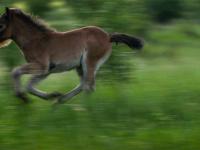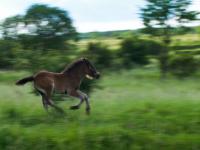Management consists of the constant presence of a small number of Exmoor ponies. In fact, they are not wild horses, but an ancient breed surviving for centuries in isolation from ordinary domesticated horses in the moorlands of South West England. As a result, it has retained a way of life, habits, and instincts that make it suitable for use in the management of naturally valuable non-forest areas in Europe. Exmoor ponies are very undemanding and, apart from a permanent water source, they make do with what the site offers. They do not require additional feeding or intensive veterinary care. When grazing, they prefer low-nutrient forage, such as poorly digestible (for other large herbivores) straws of wood small-reed, or common reed in wetlands. Grazing by these horses creates a colourful mosaic of different types of grassland, which is characterized by smooth transitions between different types of vegetation and also a large proportion of low-grazed patches. The big advantage for the insect communities on the site, and especially the species bound to the faeces of large herbivores, is the fact that it is not necessary to regularly apply antiparasitic agents to Exmoor ponies. If these are used, they get into the environment with the droppings, are toxic to invertebrates developing in the droppings, and persist there for a long time. On Exmoor pony pastures, however, the droppings are clean in this respect and allow the formation of species-rich communities of this specific group of insects.
 
This type of management is used at Ma┼íovick├í st┼Öelnice and Havranick├ę v┼Öesovi┼ít─Ť project sites.
 
 








